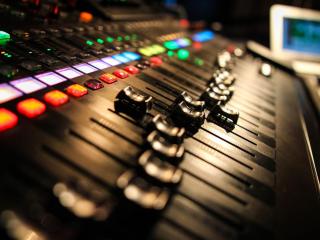
Over the years, music has made some sizable shifts in the traditional music industry that have been in place for so quite some time. As industry experts try to make sense of all of this, it is important that audio engineers stay current on new music trends.
Today we will take a look as some of the most important music trends that have begun to shape the music industry into something new and refreshing and how they may (or may not) affect your future as an audio engineer.
A Change in Business Models
As the music industry continues to transform, one of the most significant music trends to emerge is the way business is conducted. Publishers, artists, and songwriters are taking a step back from the traditional business model and are trying to reinvent new ways to rake in revenue.
Let's take a look a some of the newest business models that are being adopted and how this may affect your career as an audio engineer.
Digital Music Stores
Straying away from brick-and-mortar stores, retailers are not focused on selling music online. Customers are purchasing digital downloads of music, rather than receiving a physical product. In addition, it is no longer required by consumers to purchase entire albums. They can simply pick and choose what they want to purchase using popular outlets such as Apple's iTunes store. In the end, for the music industry this means that a band or artist's success is not necessarily tied to album sales.
Open Content

Many peopel in the music industry fear that the illegal sharing of music is unstoppable. Therefore, in response to this rising trend of "stolen" music, some artists are steering towards allowing their music to be considered open content and freeing it from a price tag. Though this is not a popular choice amongst the majority of artists, this idea is growing in popularity as the problem of pirated music increases. Artists are now being forced to try new ways to make a profit through such things as touring, selling merchandise, and fan clubs.
Although the changing nature of music's business model is affecting the music in unparalleled fashion, consumers are demanding instant purchasing power when it comes to their music. The truth is, audio engineers are still needed. Music must still be professionally recorded, bands will continue to tour, and radios will continue to broadcast songs, and videos will still be created.
Social Media: The New Metric For Success
The music industry has quickly realized that social media is a trend that is staying. Offering many opportunities to musicians of all kinds, social media presents a unique way to connect with large fan bases with relatively little effort while still providing a large source of income.
Using social media to launch new music increases exposure for musicians and helps boost ticket sales, digital downloads, and merchandise purchases. It also helps create large followings and allows for an open way of sharing experiences.
For audio engineers, this experience with online music promotion is a key factor in becoming valuable in a competitive market. Consider learning how to create and edit video content for all social media platforms. It is guaranteed that all top notch musicians will want a large online presence.
Streaming
Streaming services have become one of the biggest music trends to hit the music scene in a long time. In fact, services such as Pandora and Spotify contributed to 33% of total recorded music revenues in the first half of 2015.
Through the use of paid subscriptions that allow people constant listening or the free services using ads for revenue, music streaming is technology that has the potential to affect how audio engineers work in the recording studios. Fans want total control over what they listen to: they want music on demand. And unfortunately, the music industry must listen.
The Rise of EDM

Electronic dance music is huge these days and is hitting mainstream music outlets at alarming rates. Rather than producing music in a traditional sense, which is in a recording studio with a full band, it is up to audio engineers to master the techniques required for mixing and remastering many types of music in what is one of the most popular music genres in today's culture. In fact Eventbrite noted that there was a 50% increase in new EDM music organizers just in the past year, with hip hop ranking in at a close second. In the end, understanding music trends infused with technology will increase your worth as an audio engineer.
Indirectly, all trends that hit the music scene are going to impact your career as an audio engineer in some way. Staying up-to-date on the changing industry will keep you ahead of the game and in full control of your career path.



